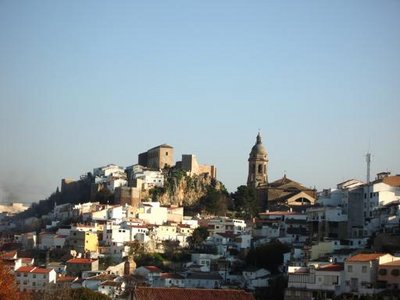
Something about Spain enticed Paul to move from England to the town Loja in the province of Granada.
Here, Paul shares some of his everyday experiences as an expat in Spain, his work as a writer, and his observations about the Spanish people and their culture. He also imparts a few tips that people would do well to consider before they decide to move to Spain.
Originally posted March 28th, 2007
I was born in London, England and living now in Loja, a small town in the province of Granada, Spain
 I live with my partner Cherry, and a small bear called Yogi, that is in reality a dog, but likes to think of himself as a fierce bear.
I live with my partner Cherry, and a small bear called Yogi, that is in reality a dog, but likes to think of himself as a fierce bear.
-How long have you been living there?
We have been in Spain for about 12 years, living first in the Catalan area, then in the heart of Spain – Toledo – for several years and finally now in the south.
-When did you come up with the idea of living in Spain?
Spain always meant, for me, something almost non-European. Historically and politically, it’s had an edge about it that has always drawn me to it. As a result, I took a course in London where I had to study for a year at Seville University and then, after that moved over full time.
-Was it hard to get a visa or a working permit?
Not at all. In fact, many ex-pats don’t even bother. If you want to be involved legally though, it’s essential, it opens doors and makes things a bit easier.
When I first came it was thumbprints, interviews with the Guardia Civil and proof of not having had a prison sentence in the UK. Things have simplified somewhat since then.
-Was it difficult for you to get medical insurance before you went there or when you first arrived?
Again this is a personal issue. If you pay into the state, you have a right to health care. Spain has a wonderful health service, far better than anything I experienced back in the UK.
-How do you make your living?
Work has come in many forms and guises over the years, from waiting in bars in a Jazz club in Toledo, teaching computers to Language teachers in Barcelona, and finally running a shop and market stall on the coast.
Apart from the Jazz bar, work has been generated by myself or my partner, and this I believe is the key. Spain has high unemployment so you have to be flexible and very creative to make a living here outside the world of teaching English. Now I write for different websites, magazines, and I’m working on a book.
 -Do you speak Spanish and do you think it’s important to speak the local language?
-Do you speak Spanish and do you think it’s important to speak the local language?
Obviously, it’s a huge benefit to life here if you speak the language.
Without language, you are seriously handicapped, almost as though you are seeing the world through a distorted vision.
Only by understanding the language can you understand the culture and the society you are part of.
Without this comprehension, mistakes and misinterpretations are made daily which leads to confusion or worse, discrimination against those people who are in fact your hosts.
-Do you miss family?
Ten years ago I would have said it’s been difficult. But now, with Ryan Air, it’s much easier for me and my family to keep in touch.
Skype, Jahjah and the broadband revolution have brought us all much closer, so no, there’s not much I miss from the UK.
-Do you have other plans for the future?
We have moved so often this last decade, I couldn’t say where we will be 10 years from now. Probably not where we are now. But who knows?
We are working on some websites and ideas at the moment that we hope to bring to fruition over the next 12 months.
-What about housing, have you bought, or are you renting a home? How much do you pay for it?
We did buy on the coast, but it’s such a cut-throat world at the moment, that we have moved away to reserve what little sanity we have left. Inland, things are not that different though on the rental sector.
On the coast though, it’s much more difficult to find year-round rents as landlords want to rent out at very, very high prices over the summer, so favor just 8-10 month lets.
Inland you can find flats much easier, but the year-round rent is not that cheaper. Obviously, it all depends on the size, location and state of each place, so generalizing is very difficult.
On the coast of Granada, it’s not unusual to spend 500 – 700 euros a month for a three-bedroom flat. But again, all depends on location and view etc., etc.
Here things are cheaper, but not that much. Spain is no longer the cheap alternative in Europe.
-What is the cost of living in Spain?
Accommodation, as I have already said, is not cheap, neither is gas nor electricity. But eating out is very cheap here, as are many of the basic shopping items, vegetables, bread, wine and other basics.
Plus, a lot of stuff is laid on for free. Fiestas and events run all year round for next to nothing. For example, our town hall runs a free cine club every fortnight.
-What do you think about the Spaniards?
Of all the places we have lived, this place has a real friendliness compared to the coast or some other more tourist-centered towns.
We are treated well and as ordinary citizens. Not as anything special, which is how I like it. I am aware that many other ex-pats find it difficult to integrate though, but that might just be because they speak no more than 5 words of Spanish.
-What are the positive and negative aspects of living in Spain?
Tapas and wine are excellent as are the breakfast and the coffee which are the best in the world. Certainly down here. And of course the local fiestas.
Every other week something is put on by the town hall and it’s wonderful to see so much interest in maintaining traditions and customs. Politically, it’s a very interesting place to live as the spectrum here is clearly defined.
Unlike in other democracies where a huge grey cloud exists between right and left, here Spain retains its very old distinctions of radical and conservative thought.
So for those that like people to speak their minds, take to the street and demonstrate their politics, Spain is a great place to be.
-Do you have any tips for our readers about living in Spain?
Learn the language. Read the history because Spain is still writing it at the moment and it will help to contextualize your life here.
Finally, dip your toe in first. Vast numbers return to their homelands each year disenchanted and frustrated at life here. Many returned because they had no idea what to expect.
My advice is to be clear about what you want, then dip your toe in and check the temperature of the water. Only then jump.
-Do you have any favorite Web sites or blogs about Spain?
Notes From Spain – good forum and home of many a fine podcast.